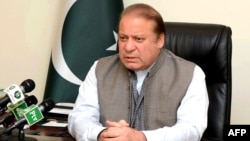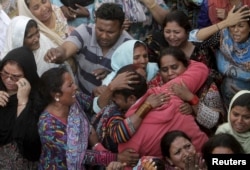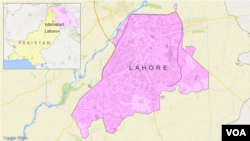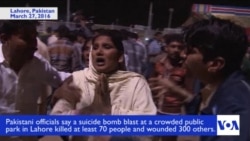Pakistan’s Prime Minister Nawaz Sharif has vowed to intensify counterterrorism operations in the wake of Sunday’s deadly suicide bombing in the eastern city of Lahore targeting Christians. At least 72 people, including about 30 children, were killed and 300 others were wounded in the blast at a crowded park.
“I know terrorists are attacking soft targets like public places and parks, killing innocent citizens in desperation because security forces have deprived them of their hideouts, training facilities and terrorist infrastructure,” Nawaz Sharif said in a televised address Monday, vowing the mission to wipe out "these terrorists" will not be deterred by such attacks.
A military spokesman said Monday that security agencies have conducted several operations based on initial leads and arrested “a number of suspect terrorists and facilitators” from areas in the provincial capital and two other cities (Multan and Faisalabad) of Punjab, the country’s most populous province. He shared no other details.
A spokesman for a breakaway faction of the Pakistani Taliban (Jamaatul Ahrar) claimed responsibility for the deadly bombing, saying it was aimed at Christians.
Sharif visits Lahore
Prime Minister Sharif visited Lahore on Monday morning, where he chaired a meeting of top civilian and security officials. The prime minister also visited hospitals where victims are being treated.
Later, the foreign ministry said Sharif was canceling his planned trip to Washington this week to attend a nuclear security summit due to the Lahore attack.
"He [Sharif] underscored that such incidents further strengthen the government’s resolve to eradicate the menace of terrorism from its roots," a foreign ministry statement said.
It said the Pakistani delegation to the Washington summit will now be led by the Minister of State and Special Assistant to the Prime Minister, Syed Tariq Fatemi.
Eyewitness accounts
Witnesses speaking to reporters Monday recounted how the blast rocked the park.
Ikram Arif said he was parking his motorcycle and was about to enter the park with a friend when they suddenly heard the sound of an explosion from inside.
"We rushed inside and saw bodies with blown-up heads and legs. Many injured people, men, women and children were lying there," he said, adding the first injured person he picked up was an infant around 6 months old.
Eyewitness Mohammad Arshad criticized authorities for not ensuring proper security in and outside the park.
"It was a very loud explosion, and moments later we saw a pool of blood with bodies and injured lying here and there. There was no proper security arrangement here," he added.
International condemnation
The United States condemned "in the strongest terms" the attack in Lahore. White House spokesman John Earnest said the attack was "grotesque, and the fact that you have an extremist organization targeting religious minorities and children is an outrage."
He said even though the attack targeted Christians, "the fact of the matter is that based on the names that we're seeing now, the majority of the victims were actually Muslims."
United Nations Secretary-General Ban Ki-moon also released a statement strongly condemning the bombing and calling for "the perpetrators of this appalling terrorist act to be brought swiftly to justice, consistent with human rights obligations."
He urged the Pakistani government to do its utmost to put in place protective measures to ensure the personal security of all individuals, including religious minority communities living in the country.
Authorities have increased security in parks and other public locations across Pakistan following the Lahore carnage.
Islamabad protest
Meanwhile, several hundred Islamist activists were still staging a protest Monday morning near the parliament in Islamabad, and refusing to disperse until their demands were met.
PHOTOS: Pakistan mourns Easter suicide bombing victims
Thousands of demonstrators had marched on the capital city late Sunday evening to protest the hanging of a man charged with murdering a provincial governor because he had called for reforming the country's Islamic laws against blasphemy.
The protesters, mostly activists of Islamic parties, rallied against the execution of Mumtaz Qadri, who gunned down Punjab's governor, Salman Taseer, in 2011 because the slain politician had called for blasphemy law reforms.
The demonstrators clashed with police and paramilitary forces while setting fire to private and government buildings.
The clashes wounded more than two dozen security personnel, prompting the government to deploy troops to protect the so-called Red Zone in Islamabad where mostly key official buildings, including parliament and foreign diplomatic missions, are located.
The protesters were demanding, among other things, assurances that the government will not change the blasphemy laws. However, the deployment of troops acted as a deterrent and most of the crowd dispersed in the middle of the night.
WATCH: Video footage from scene of attack in Lahore









